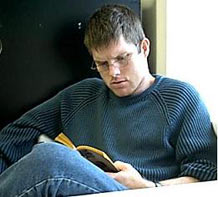 Thursday, November 24, 2005
Thursday, November 24, 2005
Ain't nothin' gonna break our stride.

Saturday evening the Gulf Coast Symphony Orchestra gave its first concert since hurricane Katrina.
The concert program was as follows:
Carl Nielsen: Helios Overture, Opus 17
Claude Debussy, Arr. Arthur Luck: Clair de lune
Christopher Theofanidis: Rainbow Body
Gustav Holst: The Planets, Opus 32
A large portion of Biloxi looks like the above picture; other parts of the town were just washed away completely. The Saenger Theatre (the home of the Gulf Coast Symphony) along with a couple blocks of downtown Biloxi were spared. The buildings stand in the lee of the Beau Rivage Casino which deflected some of the storm surge away from parts of downtown Biloxi. The Sun Herald has quite a few before and after pictures of the Mississippi Gulf Coast. Katrina also flattened the Ohr-O'Keefe Museum honoring Biloxi's mad potter, George Ohr. The museum was designed by Frank O. Gehry and was expected to open in 2007.
I wasn't able to attend the GCSymphony concert, but it is a wonderful sign that the arts are alive in the area hardest hit by Katrina.
posted by Everette Minchew
10:13 AM
|
|
 Composer Everette Minchew (born 1977) is consistently active in the creation, performance, and promotion of contemporary music. Moderately prolific, his catalogue includes small chamber pieces for violin, piano, various wind instruments, harpsichord and electronic music. Current commissions include a string trio and an opera based on an 11th-century crusades tale.
His earliest musical training came at the age of eleven when he began playing alto saxophone; it wasn’t long until he began his first attempts in composition.
Composer Everette Minchew (born 1977) is consistently active in the creation, performance, and promotion of contemporary music. Moderately prolific, his catalogue includes small chamber pieces for violin, piano, various wind instruments, harpsichord and electronic music. Current commissions include a string trio and an opera based on an 11th-century crusades tale.
His earliest musical training came at the age of eleven when he began playing alto saxophone; it wasn’t long until he began his first attempts in composition.
He received a Bachelor’s Degree in Music History from the University of Southern Mississippi, where he studied saxophone under world-renowned soloist, Lawrence Gwozdz.
Fearing that traditional university training would hinder his development as a progressive composer, he abandoned the idea of formal lessons in favor of an intense private study of modern masterworks.
Minchew's works are characterized by their intense timbral explorations and brutal dissonance. That is not to say, however, that the compositions are devoid of beauty. In the first of the Two Brief Pieces, for example, the harpsichord chimes stringent yet haunting chords evoking a sense of loss.
Other pieces, like the Figment No. 2 "Juggler's Fancy" play upon the kaleidoscopic interaction between timbres and tones. The rapid alternation of pizzicato, arco bowing, and extreme glissandi remind the listener of Xenakis coupled with a Berio Sequenza. Minchew's Invention "Two-Part Contraption" for piano owes much to Ligeti's etudes and boogie-woogie jazz.
His music has been performed around the United States, and he was the featured composer at the 2005 Intégrales New Music Festival in Hattiesburg, Mississippi.
He currently resides in Hattiesburg, Mississippi with his wife, Cheryl.
CONTACT INFORMATION
| |



